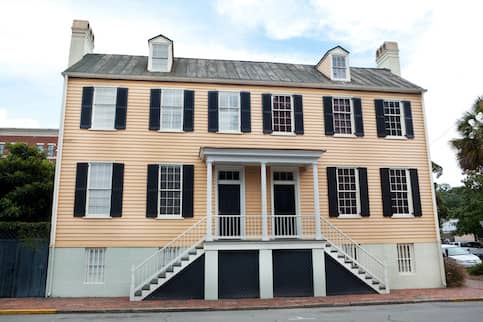If you’re eligible based on your service to our country or you are an eligible surviving spouse, VA loans are among the best deals around, often requiring no down payment. With rising interest rates, the low initial rates for adjustable-rate mortgages (ARMs) can be a great advantage for active military members or others who may move or refinance soon. Let’s take a closer look at VA ARMS, how they work and their requirements to get approval. We’ll break down some of the pros and cons of getting one, too.
What Are VA ARM Loans?
VA ARM loans are adjustable-rate mortgages backed by the Department of Veterans Affairs (VA). ARMs have interest rates that adjust up or down with the market after a certain period. Structurally, VA ARM loans work the same as other ARMs in terms of handling adjustments.
See What You Qualify For
Buy A Home
Discover mortgage options that fit your unique financial needs.

Refinance
Refinance your mortgage to have more money for what matters.
Tap Into Equity
Use your home’s equity and unlock cash to achieve your goals.
How Do VA Adjustable-Rate Mortgages Work?
VA adjustable-rate mortgages are functionally the same as any other ARM. They remain at a fixed rate for a given period of time at the beginning of the loan. At the end of the fixed period, they adjust at given intervals. There are caps and floors that limit how much the rate can adjust up or down initially, on each subsequent adjustment and over the life of the loan.
When the rate adjusts, it does so based on an index. Whatever index is used is added to a margin and rounded to the nearest 0.125%.
In the case of VA loans, the index used for adjustments is the 1-year constant maturity treasury (CMT). Interest rates adjust up or down once per year after the fixed period on a date specified in your mortgage contract. Though not a hard rule, most ARMs are based on 30-year terms.
5/1 ARMs
If you’re looking into a VA ARM loan, you might see terms like “5-year ARM.” This refers to the period during which you’ll have a fixed interest rate before your mortgage lenders make any adjustments. In a 5-year ARM, the interest rate you get won’t change for the first 5 years after you close on your mortgage. After the initial 5-year period, your rate starts to fluctuate based on a fixed schedule. Let’s take a closer look at an example.
5/1 Adjustable-Rate Mortgage: Interest Rates And Caps
With a 5/1 ARM the initial interest rate is in place for 5 years. After that, your rate will change once a year. For each interest adjustment, you have a rate cap. That means your rate won’t go up or down more than a set percentage (usually 1%). Your interest rate will also have both a cap and floor for each subsequent adjustment.
There are also set limits on the lifetime adjustment for the loan. For example, your rate for the lifetime adjustment limit might be capped at 5% (this is the typical limit). This would mean that if you start with a 5% rate, your interest rate will never be higher than 10% during the life of the loan.
5/1 Adjustable Mortgage Rate Example
Let’s take a look at an example to get a better understanding of how a VA ARM might look in practice.
Say you take out a VA ARM with an introductory rate of 6%. Your payments will be consistent for the first 5 years of your loan. For the 6th year of your loan, you may pay up to an additional 1% in interest, bringing your interest rate up to 7%.
Depending on the market, this rate could be different. It may only adjust by 0.25%, bringing your rate to 6.25% or it could even go down (note that a floor will typically be in place to limit how much your rate can drop). Every year afterward, your mortgage will adjust once a year with the same cap rate limitation. Your set lifetime limit means there is a cap on your interest rate. If this limit were set at 5%, as is typical, your rate would never rise past 11%.
Getting An ARM Vs. A Fixed-Rate Mortgage
When might you choose an ARM over a fixed-rate mortgage? You should consider an ARM if you especially need a low initial rate and/or if you expect to be in and out of the home before your rate ever adjusts.
As interest rates rise, ARMs tend to have initial rates that are quite a bit lower than fixed rates. That means that for those first years of the ARM you’ll get a lower rate than you would on a comparable 30-year fixed mortgage. That’s because the rate can be adjusted and doesn’t require investors to try to project inflation over a long period of time.
If you plan to sell your home within a few years, you won’t need to worry about the rate adjustments at all. This is particularly helpful for military families on active duty who might need to move frequently.
The VA also gives lenders the option of providing loans with 1-, 3- and 5-year fixed-rate periods of the beginning of ARMs.
Find A Mortgage Today and Lock In Your Rate!
Get matched with a lender that will work for your financial situation.
Who Is Eligible For A VA ARM?
In order to be eligible for a VA ARM, borrowers have to meet the service time requirements that would come with any VA home loan. The exceptions to this include veterans receiving VA disability due to a service injury and surviving spouses who receive dependency and indemnity compensation (DIC). The VA has a breakdown of minimum service time requirements.
Though the VA sets guidelines it does not set individual home loan requirements. You’ll also need to meet your mortgage lender’s requirements to qualify for a VA ARM.
What Requirements Do I Need To Qualify For A VA ARM?
There are several requirements for getting a VA loan. A couple of these are imposed by the VA itself, but the majority of this is left up to lenders.
- FICO® Score: The VA has no credit score requirements, so lenders set their own limits. Most look for a score between 580 and 620 in order to qualify. It’s important to note that you may be able to qualify for a bigger approval amount and better rate if you have a better credit score.
- Minimum down payment: Generally, there is no down payment required on VA loans. You might need to make a down payment if you have previously used VA entitlement that hasn’t been paid back. In this case, a lender will likely require you to make up the difference between your remaining entitlement and the 25% guarantee normally given by the VA.
- Debt-to-income ratio (DTI): The VA doesn’t set hard and fast DTI rules for lenders. At or above 620, in most cases, the VA automated underwriting system will make a call based on a variety of factors. In most cases, this will be at or around 41%.
- Certificate of Eligibility (COE): Your COE verifies your service-based eligibility for a VA loan. In order to get one, you can easily request a copy online on the VA website. Lenders also have access to an online system that can help you get your COE quickly.
Pros And Cons Of A VA Adjustable-Rate Mortgage
There are advantages and drawbacks to every loan option and the VA ARM is no different. Let’s take a look at some of the advantages and disadvantages of this loan type.
Pros Of A VA ARM
- Lower initial fixed rate: VA ARMs generally come with an interest rate lower than fixed rate loans for the first part of the loan term. Some clients use this time to make extra payments toward the principal balance so that their payment will be lower than it otherwise would be if the interest rate increases on adjustment.
- Fee exclusions: While you generally have to pay a funding fee, some groups are excluded including veterans receiving VA disability, eligible surviving spouses and those who have earned a Purple Heart currently serving on active duty.
- No prepayment penalties: The VA doesn’t allow lenders to charge a fee if clients pay off their loan early.
- Short-term ownership benefits: Service members often move around quite frequently. If you sell before the fixed period on your ARM expires, you can take advantage of the low rate without the possibility of it going up.
Cons Of A VA ARM
- Interest rate increases: Any time you have an ARM, there is the potential for the rate to increase at the time of adjustment. One way to avoid payment shock is to see if you can afford the payment if the interest rate is adjusted to its highest possible level under your caps.
- VA funding fee: Most clients will wind up paying the VA funding fee, which can be anywhere between 0.5% and 3.3% of the loan amount, depending on whether it’s your first time using a VA loan and the loan purpose. Keep in mind that if you can’t pay the funding fee upfront it can be built into your loan amount.
How Do I Apply For A VA ARM Loan?
When applying for a VA loan, there are many things you should expect to provide, most of which are common to any mortgage application. The exception is the COE. Here are some of the documents you should have on hand for when you start the mortgage process for a VA loan:
- Certificate of eligibility
- Pay stubs
- Bank statements
- W-2s
- Tax returns
Your lender will also run a credit check and take a look at your credit report. They may request additional documentation during the application or underwriting process.
The Bottom Line
A VA loan offers a ton of benefits for those who have served our country. In a real estate market where interest rates are rising, a VA ARM may be more attractive due to its lower initial interest rates. VA ARMs come in a variety of fixed-rate lengths at the beginning of the loan, adjusting once per year afterward.
Find A Mortgage Today and Lock In Your Rate!
Get matched with a lender that will work for your financial situation.

Kevin Graham
Kevin Graham is a Senior Writer for Rocket Companies. He specializes in economics, mortgage qualification and personal finance topics. As someone with cerebral palsy spastic quadriplegia that requires the use of a wheelchair, he also takes on articles around modifying your home for physical challenges and smart home tech. Kevin has a bachelor's degree in journalism from Oakland University.












